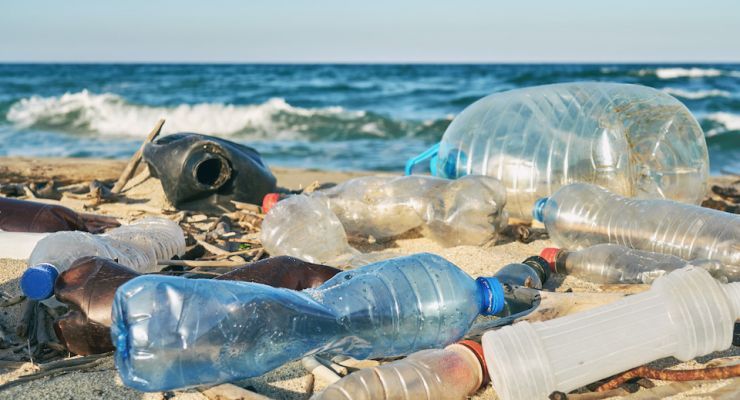Not so long ago, it was common practice to use plastic plates, cutlery, and straws when hosting a party, and throw them all away afterward to reduce clean-up. Bottled water was in vogue, and everyone had a huge stash of grocery bags stuffed in the cupboard below the sink. Tupperware, saran wrap and Ziploc bags were the go-to kitchen conveniences, and washing and reusing a red Solo cup was simply unthinkable.
Nowadays, we know better – and thank goodness the world is beginning to wake up to the colossal problem of plastic waste and swallowing up our planet. Every year, billions of tons of plastic wash up on our beautiful coastlines. It’s been a few decades of using this stuff, and already it can be found on every single part of the planet, including Antarctica.
Unfortunately, the problem is still getting worse. By 2050, we’ll be making more than three times as much plastic stuff as we did in 2014, and our landfills and oceans will be overflowing. At the same time, plastic in the ocean could outweigh fish pound for pound, according to a report by the Ocean Conservancy.
Can’t we just recycle?
Isn’t it ok to use plastic bottles as long as we put them in the recycling? The problem is, when plastic is recycled, it is down-cycled into a lower form until it becomes unusable and is sent to a landfill. A recent PBS investigative documentary explains that when the US public tried to push back against plastic waste in the 1980s, the industry started promoting recycling as a solution – even though industry executives knew it wasn’t viable. The record isn’t great…National Geographic reports that only 9 percent of the plastic ever made has been recycled. And now we’re stuck with a problem that weighs 8.3 billion metric tons. A problem that is growing every day. Most of it made up of disposable items that didn’t need to get made in the first place.
How to use less plastic every day
Life with less plastic is certainly the best option, and there is no reason that we shouldn’t be able to live without it. Mass-produced plastic goods have only been around for a couple of generations. Our parents or grandparents can surely still remember the days of reusable glass milk bottles and meat wrapped in simple brown paper instead of plastic. Although avoiding plastic is more difficult in modern times, here are some simple steps you can take to make a difference in your everyday life.
Avoid single-use plastic items
The Ocean Conservancy reported that some of the most common items found in beach and ocean clean-ups include plastic beverage bottles, plastic straws, and stir sticks, plastic bottle caps, and plastic bags – so avoiding the use of these items can make a difference in pollution levels.
Since recycling plastic is largely a pointless exercise, the first step is to take a stand and refuse to accept disposable plastic items when purchasing products and services in your everyday life. Try creating your own “zero waste kit” with a selection of everyday items such as a collapsible coffee cup, stainless steel straw, reusable cutlery, cloth napkin, and lightweight vegetable and grocery bags. You can even bring along some lightweight nested containers in various sizes, which will allow you to purchase takeout food without a disposable container. You may get some curious looks when you request that your spring rolls get put in your own container, but you’ll be helping to establish the new normal!
Check your personal care products
From lipstick to sunscreen and beyond: micro- and nano plastics are added to many personal care products. These plastic particles, hardly visible to the naked eye, flow straight from the bathroom drain into the sewer system. Wastewater treatment plants are not designed to filter them out; that is how microplastics contribute to the ‘plastic soup’ swirling around in our oceans. These toxic particles can then accumulate in the bodies of humans and animals, where they can cause hormone disruption and cancer. You can check your favorite brands at BeatTheMicrobead.org and try switching to plastic-free alternatives.
Find your local refill station
Most towns nowadays have at least one store where you can refill products such as dish soap, shampoo, and laundry detergent. You can also buy foods in bulk without the packaging and even refill your own jar with peanut butter. Glass milk bottles are experiencing a resurgence too. If you can’t find a bulk store or refill station locally, try looking for a service that delivers to your town, or ask local people on Facebook if they have found any solutions in your area.
Rethink your lifestyle
Try using an app such as Recycle Coach or My Little Plastic Footprint for a fun, game-based approach to reducing plastic consumption. These apps offer practical tips and show you how to replace each plastic item with a sustainable alternative.
While it may take some upfront effort to set up your new plastic-free lifestyle, before you know it, it will be second nature. Your great-grandchildren will have you to thank when they have clean oceans to swim in!
-Susan Patterson

